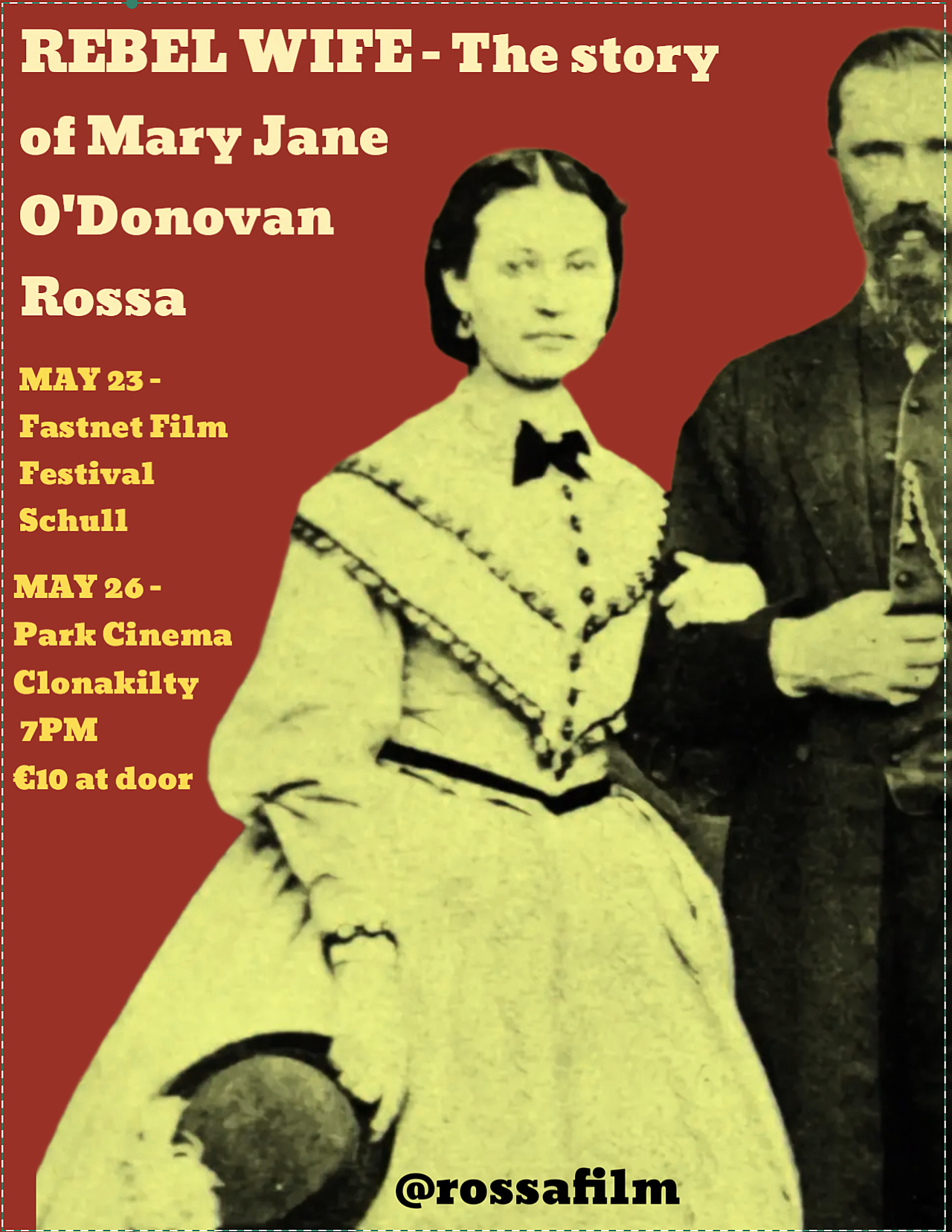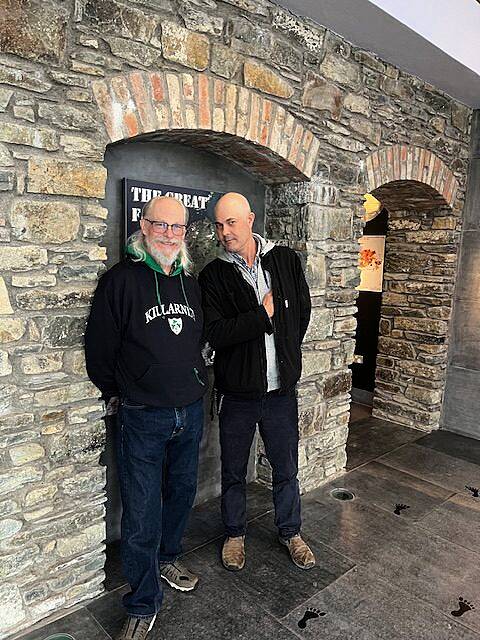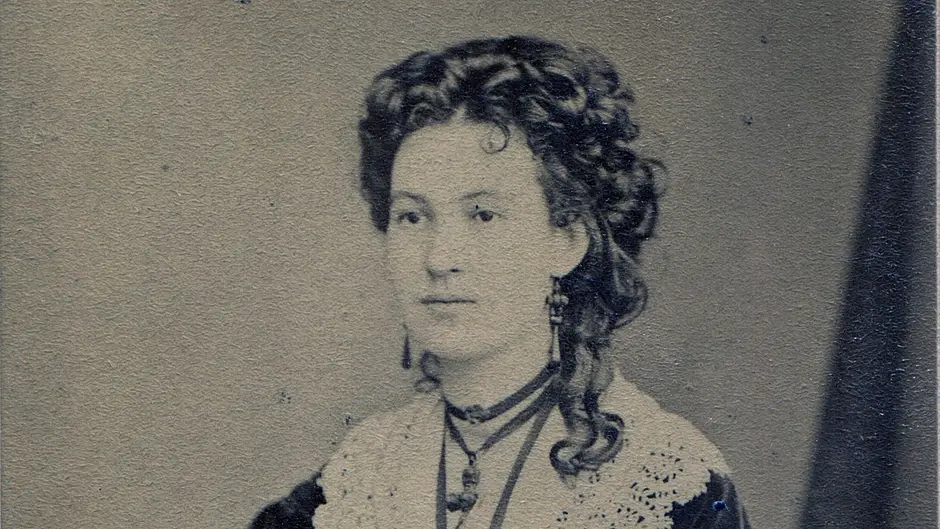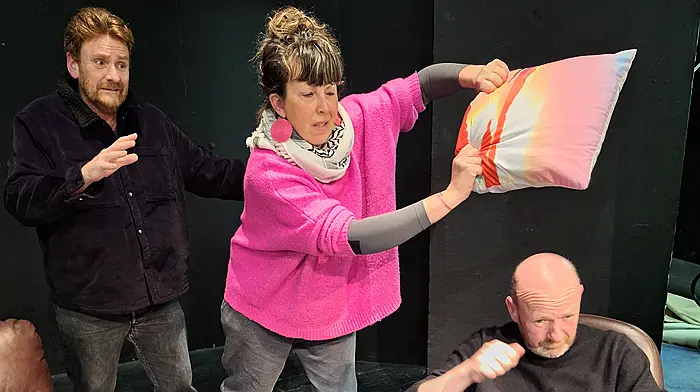The remarkable Mary Jane O’Donovan Rossa from Clonakilty campaigned relentlessly for Irish independence for over 50 years. Often simply dubbed a patriot’s wife, or a prison ‘widow’, a new movie may finally get her the attention she deserves
‘ONE of the most active and effective revolutionary women of her time,’ is how Williams Rossa Cole describes his great-grandmother, Mary Jane O’Donovan Rossa, the focus of his new feature documentary Rebel Wife, to be screened locally next week.
 The film poster for Rebel Wife.
The film poster for Rebel Wife.
Mary Jane Irwin, daughter of Young Irelander Maxwell Irwin, was born at Strand House, Long Quay, Clonakilty, and baptised on January 26th 1845, at the height of the potato famine.
Rare for a girl in those times, she received a good education at the Sacred Heart Convent, Roscrea, where she read and wrote copiously.
Aged 18, she met 34-year-old Fenian leader Jeremiah Rossa, twice widowed and the father of five sons.
Her parents nurtured greater expectations for their daughter, and begged her to have nothing to do with him.
But on October 22nd 1864 they married at the Parochial House in Clonakilty.
Republican journalist John Devoy described her as ‘an ideal patriot’s wife’, the mother of 13 children.
A year into their marriage, her parents’ fears were realised when Jeremiah was arrested.
To help raise funds for the families of some 3,000 other men detained without charge, Mary Jane founded a Ladies’ Committee and was appointed secretary.
Although pregnant with her first child, she travelled throughout Ireland, drawing attention to these arrests, and causing a public outcry.
Following the 1867 Fenian uprising, her husband was arrested again, and imprisoned ‘for life’.
He ended up in Chatham Prison, Kent, where he and fellow inmates were shackled, beaten, and kept in solitary confinement. Jeremiah urged Mary Jane to move to America.
Leaving her young son James Maxwell in Cork with her parents, she sailed for New York, where Horace Greeley, editor of the New York Tribune, encouraged her to give lectures across the USA and Canada.
After receiving elocution lessons from the celebrated Professor Joseph Frobisher, she set off, relishing the opportunity to be ‘productive’ and aid the Fenian cause.
‘I always felt I earned my living,’ she wrote.
For two years she journeyed constantly, telling patriotic stories and reciting her nationalist poetry, always sending home money for her family and other prison widows.
The newspapers covered her travels: from as far west as Omaha, to Savannah in the south, and Toronto and Montreal in the north – where someone fired a bullet through the window as she was speaking.
At first no one appeared interested in what she had to say, but by the end hundreds packed halls, she was a celebrity, The Spectator praising one of her speeches in New York as ‘of the highest order.’
Early in 1870, she returned to Ireland to help free Fenian prisoners. Her husband was released the following year.
Banished from Ireland, he sailed with Mary Jane and the children to New York, where their arrival was greeted with parades. Settling on Staten Island, they eked out a precarious living.
At one point, when Jeremiah was drinking heavily, Mary Jane returned to Clonakilty, threatening to leave him unless he gave up.
After 20 years of exile, in 1894 Jeremiah was allowed back to Ireland. On a second visit, in 1905, he was even offered a position by Cork City Council.
However, Mary Jane became ill, so they decided to return to New York, where she could recover, surrounded by her children and grandchildren.
When her husband’s health also declined, she became not only his nurse but full-time editor and publisher of his weekly newspaper, The United Irishman.
In the summer of 1915, Jeremiah’s death evoked ‘a tidal wave of patriotism,’ observed Mary Jane. Their daughter Eileen helped take his body, not to Cork as he had wanted, but to Glasnevin Cemetery in Dublin. The funeral on August 1st was attended by an estimated 14,000 people, ‘as if he were a king.’
Before returning to New York, Mary Jane took the opportunity of attending several Cumann na mBan meetings.
‘Here were young schoolgirls and mothers and grandmothers learning to be soldiers,’ she recorded. At one meeting, she was introduced to Countess Markievicz – ‘recklessly brave yet appealingly feminine.’
Back in Staten Island, the following year she received distressing news about the Easter Rising. ‘I knew those gallant men who have been slaughtered,’ she responded.
Suddenly, in a flicker, her life was over. On August 17th 1916 Mary Jane suffered a fatal heart attack.
 The announcement of Mary Jane’s death in the Skibbereen Eagle, August 19th. 1916.
The announcement of Mary Jane’s death in the Skibbereen Eagle, August 19th. 1916.
In marked contrast to when Jeremiah died, her death was hardly mentioned in the press, and her funeral was a muted affair.
Locally, The Skibbereen Eagle recorded merely three lines.
She was buried in Staten Island, away from her homeland and husband. Her lifetime achievements and sacrifices were overlooked, forgotten about.
Only now, in Williams Rossa Cole’s new film will Mary Jane Rossa finally receive the credit she deserves as a phenomenal speaker and publicist, who had ‘a pivotal role’ in Ireland’s fight for independence from Britain.
• Rebel Wife will be screened at the Fastnet Film Festival in Schull on Thursday, May 23rd, and at the Park Cinema in Clonakilty on Sunday, May 26th 7pm, €10 at the door.
Great-grandkids enjoy meeting thanks to film
THERE was a wonderful synchronicity to a recent chance meeting in Skibbereen.
The two great-grandchildren of Jeremiah O’Donovan Rossa and his friend Mortimer Downing met in Skibbereen Heritage Centre, by total coincidence.
 Tom Aguilar Downing , left, with Rossa William Cole,
Tom Aguilar Downing , left, with Rossa William Cole,who met in the Heritage Centre in Skibbereen two weeks ago.
Before he became a Fenian Revolutionary, Jeremiah came to relatives in Skibbereen in 1848 following the death of his father during the Great Famine.
He lived in the house of Mortimer Downing, who was married to his cousin, and, while the rest of his family emigrated to America, Rossa went on to become a clerk (and later manager) of Downing’s hardware shop on Levis’ Quay.
Rossa went on to rent the business premises from Morty and opened his own shop there.
Two weeks ago, Tom Aguilar Downing (Morty’s great-grandson) met up with his distant cousin, Rossa’s great-grandson Rossa William Cole, in Skibbereen’s Heritage Centre.
Rossa William Cole was in West Cork for screenings of Rebel Wife.
The film will be shown on May 23rd at the Fastnet Film Festival in Schull and on May 26th at the Park Cinema in Clonakilty.








